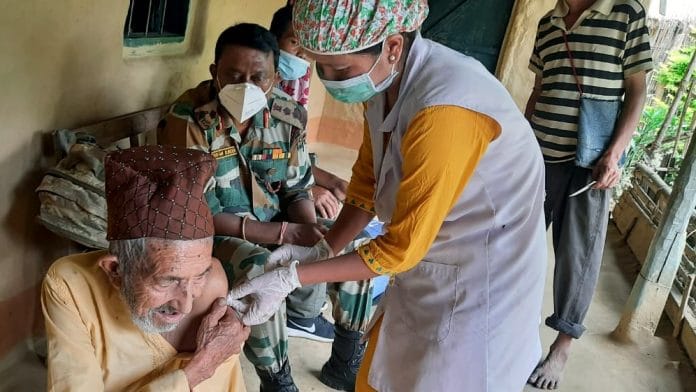New Delhi: With vaccine doses piling up in states on account of a festive-season lull, waning Covid-appropriate behaviour, and variants on the prowl, it is time the Government of India considered all strategies to increase second-dose coverage, including reducing the dose gap for Covishield, a member of the Covid National Task Force (NTF) has said.
India is currently administering the second dose of Covishield — developed by the University of Oxford with British-Swedish firm AstraZeneca and manufactured in the country by the Serum Institute of India — at a 12-16-week gap.
“We should pull all stops to increase the second-dose coverage, including, depending on the vaccine availability in states, reducing the dose gap for Covishield,” Dr Subhash Salunkhe told ThePrint.
Salunkhe then pointed out that Covishield was initially administered at a gap of 28 days, like Bharat Biotech’s Covaxin.
“Skies will not fall if we take the second dose at 60 days — we have all taken it at one month. In fact, lakhs of people have taken it at 30 days. The government may not admit it but one reason for increasing the dose gap was vaccine shortfall. Now that the situation has eased, there should be more latitude in this. People should be able to take the second dose between 60-84 days.”
The NTF is a body constituted by the Indian Council of Medical Research (ICMR) in March 2020 to steer India’s response to the pandemic.
According to Monday’s daily update on vaccine availability, more than 116.6 crore (1,16,59,92,955) vaccine doses have been provided to states/UTs so far, of which 15.6 crore (15,60,08,496) balance and unutilised doses are yet to be administered.
The matter of pending second doses has been discussed at multiple meetings between the central and state governments. At a meeting with state health ministers on 26 October, Union Health Minister Mansukh Mandaviya said over 10 crore second doses are pending despite the passage of the prescribed interval.
As of Monday, nearly 35 crore people had been fully vaccinated across India.
The Covid working group of the National Technical Advisory Group on Immunisations (NTAGI), the apex technical body of experts that assesses all vaccines before their administration, says cutting the dose gap is unlikely.
Also Read: Modi govt could reduce gap between Covishield doses amid reports of infections among vaccinated
‘Situation worrisome’
Even though India’s Covid numbers are coming down — there were 11,451 new cases in the 24 hours preceding Monday evening — Salunkhe said pressing the gas on vaccination has become important as a combination of global and local factors makes the situation worrisome.
“The fact is, people in many quarters seem to think that India is out of the pandemic and that is dangerous. The overall situation is worrisome because in Europe and China, we have seen the advent of variants,” he added.
“In our own country, through my travels, I have seen that despite the Prime Minister’s appeal to continue masking, political parties have thrown all caution to the wind and people, too, have stopped practising Covid-appropriate behaviour,” he said.
Salunkhe stated that India’s “first-dose coverage of over 70 per cent is commendable”, but added that “we need to take all measures to push second-dose uptake”.
“If, for a daily wager, concerns about loss of wages is keeping him away, maybe the government should look at that too. We need to understand that the pandemic is still very active and can go out of control very quickly if precautions are not taken,” he said.
It is also time, he added, that the government looks at a third — booster — dose for the ones most at risk.
“I raised this issue in the Covid task force meeting, too, some time back. People who are on the frontlines of Covid management, health staff, especially those with comorbidities, should be given a booster dose,” he said.
“This is also important because as air travel opens up, the likelihood of a mutant from any country reaching India also rises.”
The US and the UK are among the countries that have rolled out Covid booster doses, which are aimed at restoring vaccine effectiveness when it is deemed to have fallen.
‘No plan to reduce dose gap’
India is among the countries with the maximum gap between two Covishield doses. The United Kingdom is not only administering the AstraZeneca vaccine at a 6-8-week gap but has also allowed people to book booster doses at five months after the second dose, instead of six.
India, however, is not looking at cutting the dose gap, Dr N.K. Arora, head of the NTAGI’s Covid vaccine working group, told ThePrint.
“The UK also did not allow your Covishield initially. Why should we go by what others are doing? What we have done has worked very well for us and we will continue with this,” Arora said, replying to a question about the possibility of a reduction in dose gap.
He was referring to the row between India and the UK over the latter’s vaccination guidelines that was eventually resolved last month.
A senior health ministry official also rejected any plans of a booster dose. India’s vaccination programme started on 16 January with healthcare and frontline workers. People who got their first shot in January and second in February will be completing nine months of vaccination in a few weeks.
(Edited by Sunanda Ranjan)
Also Read: Talk of Covid booster shots not pertinent, studies show antibodies last a year: ICMR chief






